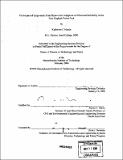The impact of large-scale solar photovoltaic adoption on prices and reliability in the New England power pool
Author(s)
Martin, Katherine C
DownloadFull printable version (3.461Mb)
Alternative title
Impact of large-scale solar PV adoption on prices and reliability in the New England power pool
Other Contributors
Massachusetts Institute of Technology. Technology and Policy Program.
Advisor
David H. Marks.
Terms of use
Metadata
Show full item recordAbstract
The potential role of renewable energy in producing electricity in industrialized countries has been gaining attention as issues like climate change and high fossil fuel prices more frequently occupy the minds of the public and policymakers. The higher levels of these technologies in power systems that are anticipated, or at least believably envisioned, make inquiries about their likely impacts on power systems relevant. The intermittency of technologies like wind and solar photovoltaic (PV) systems drives debates about whether larger scale adoption of these technologies will increase the cost of maintaining power system reliability. A more general question is simply whether these technologies will be like conventional capacity in their interaction with the larger power system, both physically and economically. These issues relate to the higher-profile debates about standby charges and if they are warranted. To address these questions, in part, for the New England power pool this study uses detailed historical data in two ways: to analyze the potential impact of large-scale adoption of PV on wholesale power prices and to compare the generation of PV systems in New England to the typical operation of conventional peaking units. (cont.) This study identifies incentives for owners of incumbent, conventional generators to resist large-scale adoption of PV and how these relate to debates about intermittency. In the short term, the effect of PV on price-spikes would be similar to the installation of more natural gas-fired combustion turbines. In this sense, incentives of owners of base-load generators to resist PV, though real, are not specific to PV. Comparison of PV generation to typical combustion turbine operation, however, suggests that growth of PV could exacerbate problems with ability of combustion turbines and other "peaking" units to cover long-term costs. This comparison shows how PV could increase the costs of maintaining power system reliability in the long-term and why owners of peaking units might resist large-scale PV adoption. It also suggests solutions in the form of considerations for policy design for policies aimed at encouraging the use of PV systems.
Description
Thesis (S.M.)--Massachusetts Institute of Technology, Engineering Systems Division, Technology and Policy Program, 2006. Includes bibliographical references (p. 62).
Date issued
2006Department
Massachusetts Institute of Technology. Engineering Systems Division; Technology and Policy ProgramPublisher
Massachusetts Institute of Technology
Keywords
Technology and Policy Program.